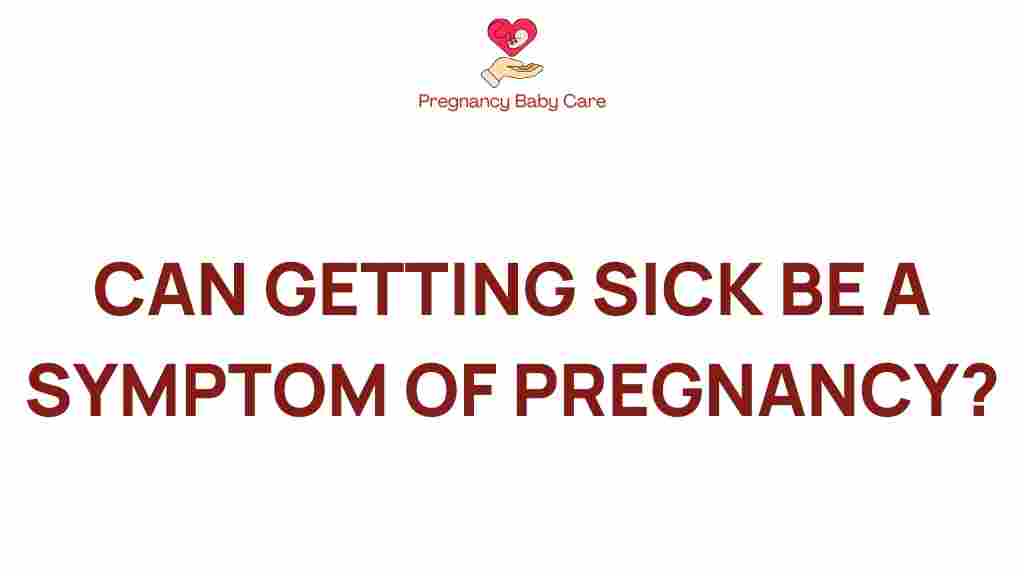Can Illness Indicate Early Pregnancy? Understanding Pregnancy Symptoms
When it comes to early signs of pregnancy, many women may find themselves questioning whether certain symptoms they’re experiencing could indicate a new chapter in their lives. Often, feelings of nausea, fatigue, and other health-related issues can arise during the early days of pregnancy, leading to confusion and concern. In this article, we will unpack these pregnancy symptoms and explore how they correlate with early pregnancy. We will also emphasize the importance of health awareness and seeking medical advice when necessary.
Recognizing Early Signs of Pregnancy
Understanding pregnancy can be a complex journey, especially when it comes to identifying early signs of pregnancy. While each woman’s experience is unique, several common symptoms can serve as indicators:
- Nausea: Often referred to as “morning sickness,” nausea can occur at any time of the day and is one of the most cited early pregnancy symptoms.
- Fatigue: A sudden increase in fatigue can be a significant indicator, as hormonal changes in the body begin to take effect.
- Hormonal Changes: Fluctuating hormones can result in various symptoms, including mood swings and breast tenderness.
- Missed Period: For many women, a missed menstrual cycle is the first clear sign that pregnancy may be a possibility.
- Frequent Urination: As the body adjusts to pregnancy, increased blood flow can lead to more frequent trips to the bathroom.
While these symptoms are typical of early pregnancy, they can also be linked to other health issues or even stress. Understanding the context of your symptoms is essential for effective health awareness.
Understanding Nausea and Fatigue
Nausea and fatigue are two of the most common symptoms experienced in early pregnancy. Here’s a closer look at each:
Nausea
Nausea often starts around the sixth week of pregnancy, though some women may experience it earlier. This can manifest as:
- Feeling queasy during the day or night
- Aversion to certain foods or smells
- Vomiting in severe cases
While nausea can be uncomfortable, it is generally a sign that your body is adjusting to the hormonal changes necessary for a healthy pregnancy. If nausea becomes severe, it is crucial to seek medical advice to ensure that both you and your baby remain healthy.
Fatigue
Fatigue during early pregnancy can be attributed to several factors:
- Increased levels of the hormone progesterone
- Physical changes in the body as it begins to nurture a developing fetus
- Emotional stress and anxiety about the pregnancy
Women often report feeling more tired than usual, which can interfere with daily activities. It’s important to listen to your body and allow yourself time to rest.
The Role of Hormonal Changes
Hormonal changes play a significant role in pregnancy symptoms. The body undergoes various changes to support the developing baby, and these changes can cause a wide array of symptoms, including:
- Breast tenderness: Hormonal changes can lead to swollen or tender breasts.
- Food cravings or aversions: Hormones can alter your taste preferences.
- Mood swings: Fluctuating hormones can lead to emotional ups and downs.
Understanding these changes can help women prepare for the physical and emotional impacts of pregnancy.
Health Awareness: When to Seek Medical Advice
While many early signs of pregnancy are normal, there are instances where it is crucial to seek medical advice. Consider reaching out to a healthcare professional if you experience:
- Severe nausea or vomiting
- Intense abdominal pain
- Heavy bleeding
- Signs of dehydration
Seeking medical advice early can help ensure that both you and your baby remain healthy throughout the pregnancy. If you’re unsure about your symptoms or have additional concerns, do not hesitate to contact a healthcare provider.
Step-by-Step Process for Confirming Pregnancy
If you suspect that you might be pregnant based on your symptoms, here’s a simple step-by-step guide to confirm your pregnancy:
- Track Your Symptoms: Keep a journal of your symptoms, noting when they began and their intensity.
- Take a Home Pregnancy Test: These tests can detect the hormone hCG in your urine, indicating pregnancy.
- Consult a Healthcare Provider: If the test is positive, schedule an appointment for a blood test or ultrasound to confirm pregnancy.
- Discuss Your Symptoms: During your appointment, share your symptoms and any concerns you might have.
By following these steps, you can gain clarity on your situation and ensure that you are taking care of your health effectively.
Troubleshooting Early Pregnancy Symptoms
Experiencing early pregnancy symptoms can be overwhelming. Here are some troubleshooting tips to help manage common symptoms:
Managing Nausea
- Eat small meals: Frequent, small meals may help alleviate nausea.
- Stay hydrated: Drink plenty of water and consider electrolyte solutions if vomiting occurs.
- Avoid triggers: Identify and avoid foods or smells that worsen your nausea.
Combating Fatigue
- Prioritize sleep: Aim for 7-9 hours of sleep each night.
- Take breaks: Allow yourself short breaks during the day to rest.
- Exercise gently: Light exercise, such as walking or prenatal yoga, can boost energy levels.
Listening to your body and adjusting your lifestyle can help you navigate the challenges of early pregnancy symptoms.
Conclusion: Understanding Your Journey
Can illness indicate early pregnancy? While many early pregnancy symptoms can mimic illness, recognizing and understanding these signs is essential for your health and well-being. Symptoms such as nausea and fatigue are common, but they should be interpreted within the context of your overall health. Always prioritize health awareness and don’t hesitate to seek medical advice when needed.
Being informed about pregnancy symptoms and understanding how they relate to your health can empower you during this significant time. For more information on pregnancy-related health topics, you can visit this resource or consult with your healthcare provider.
Your journey into motherhood is unique, and understanding pregnancy can help you embrace the changes ahead with confidence and clarity.
This article is in the category Pregnancy and created by PregnancyBabyCare Team
